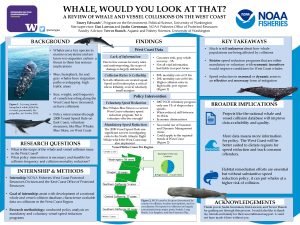REGULATING THE UNKNOWN: A REVIEW OF WHALE AND VESSEL COLLISIONS AND THEIR POLICY IMPLICATIONS
Whale and vessel collisions are a rising concern for whale species as the size and weight of traversing vessels, in tandem with the overall increase in shipping traffic, have led to a rise in deaths by collision. The nature of this topic leaves much information unknown whether because of international under-reporting, the collision not being observed due to ship size, low carcass recovery rates, etc. It is essential to address this issue as these concerns rise and climate change drives migratory populations closer to high-traffic areas to feed. In order to address this broad issue facing the West Coast Region (WCR), I worked with NOAA Fisheries evaluating collision entries from 1980-2022. I assessed all available data points to aid the construction of a preliminary national vessel collision database. Through this process, I was able to uncover information in text fields and reports, such as the portion of vessel struck that had not yet been evaluated for the WCR. This consequently informed which fields will be included in the national database. In the last two decades, collision rates have been rising, and with that comes a need for policy mitigation strategies. For the completion of my independent research, I evaluated the effectiveness of mandatory and voluntary speed reduction programs through a literature review and assessed ways they may apply to the WCR’s rising concerns. My research has concluded that the WCR must pursue a mandatory speed reduction program to mitigate whale deaths to best serve the whale populations of the region.
